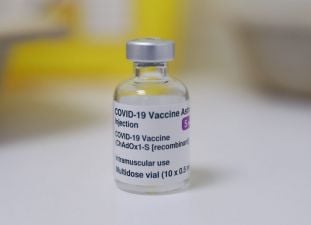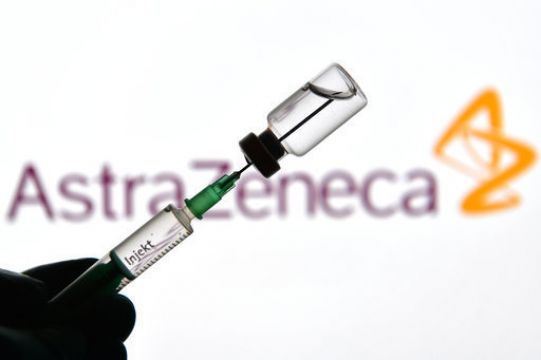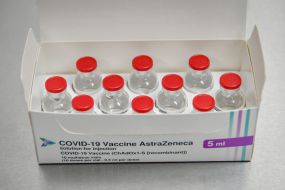Ireland has suspended use of the AstraZeneca Covid-19 vaccine due to recent safety concerns.
Several other European countries have also halted or delayed use of the jab following reports of people suffering blood clots.
We take a look at the key questions surrounding the situation.
What has happened?
A report from the Norwegian Medicines Agency released on Saturday detailed four new cases of serious blood clotting in adults after being inoculated with the AstraZeneca vaccine.
Ireland’s deputy chief medical officer Dr Ronan Glynn said in a statement on Sunday morning that, in light of this new information, the National Immunisation Advisory Committee (NIAC) has recommended the administration of the AstraZeneca vaccine should be temporarily deferred.
How serious are the safety concerns about the vaccine?
Prof Karina Butler, chair of NIAC, said on Sunday that the committee was assured of the “proven effect” of the AstraZeneca vaccine and its benefits at preventing serious effects from Covid-19.
She said that a “safety signal” was raised in Norway about “four serious, very rare, very serious clotting events” that would not normally be expected, but she noted that “clotting problems happen to people irrespective of whether they get the vaccine”. She hoped that these reports were just an overreaction and that a decision would be made concerning the safety of the vaccine within the week.
Ireland’s medicines regulator has received a small number of reports associated with blood clots following vaccination with the AstraZeneca vaccine, but none of the nature seen in Norway.
The Health Products Regulatory Authority (HPRA) said on Sunday afternoon that there is currently no indication that vaccination was the cause of these events.
In a statement, NIAC said that “to date, no reports of similar events to those in Norway had been received by the HPRA.” Over 117,000 doses of the AstraZeneca Covid-19 vaccine had been given in the Republic to date, it noted.
Dr Glynn told RTÉ on Sunday that there was no evidence that the AstraZeneca had caused the “unusual cluster” in Norway where there was “very serious” and “very rare” blood clotting in the brains of people in their 30s and 40.
However, the rollout of this vaccine was being paused as a precaution, particularly because it was due to be given to people aged between 16 and 69 with serious underlying health conditions and who were at risk of very severe disease from Covid-19.
Which countries are involved?
Denmark, Norway, Iceland and Bulgaria have said they are temporarily halting all AstraZeneca vaccinations to investigate the reports, while Thailand is delaying use of the vaccine.
Italy's northern region of Piedmont said on Sunday said it would temporarily suspend administering the shots after a teacher died following his vaccination on Saturday.
Austria, Estonia, Latvia, Luxembourg, Italy and Lithuania have suspended jabs from one particular batch of one million AstraZeneca doses, which was sent to 17 EU countries.
Spain has already administered all the doses from the batch, with the country's monitoring system to follow up on people after vaccination only detecting light side effects such as headaches, dizziness and intestinal troubles.
Other European countries have said they will not halt their AstraZeneca vaccine rollout, including Portugal, France and Germany.
So what has the European medicines regulator said?
The European Medicines Agency (EMA) has been investigating a number of reports of clotting events following vaccination with the AstraZeneca jab. Further information is expected from the EMA in the next few days.
The regulator backed the use of the vaccine on Thursday, saying its benefits outweighed its risks and it could continue to be administered.
The EMA said there had been just 30 reports of blood clots among close to five million people given the vaccine across Europe.
And in the UK?
The UK’s Medicines and Healthcare products Regulatory Agency (MHRA) has also said there is no evidence to suggest the vaccine causes blood clot problems, after more than 11 million doses were administered across the UK.
What about the WHO?
A World Health Organisation (WHO) expert advisory committee on vaccine safety is currently looking at the vaccine but the organisations says there is no reason not to use it.
Spokeswoman Margaret Harris told a briefing on Friday that the AstraZeneca jab was an “excellent vaccine” and that no causal relationship had been established between the shot and the health problems reported, calling the pause in use “a precautionary measure”.
Are scientists worried?
The overwhelming scientific opinion is that there is no certain link between blood clots and the vaccine, and the reported cases could easily be coincidental.
They argue the risks from Covid-19 far outweigh any potential side effects from the jab, with many saying blood clots are fairly common, regardless of vaccination.
Stephen Evans, professor of pharmacoepidemiology at the London School of Hygiene & Tropical Medicine, said: “The problem with spontaneous reports of suspected adverse reactions to a vaccine are the enormous difficulty of distinguishing a causal effect from a coincidence.
“This is especially true when we know that Covid-19 disease is very strongly associated with blood clotting and there have been hundreds if not many thousands of deaths caused by blood clotting as a result of Covid-19 disease.
“The first thing to do is to be absolutely certain that the clots did not have some other cause, including Covid-19.”
What has AstraZeneca said?
AstraZeneca said it has not found any increased risk of blood clots.

It said: “An analysis of our safety data that covers reported cases from more than 17 million doses of vaccine administered has shown no evidence of an increased risk of pulmonary embolism, deep vein thrombosis or thrombocytopenia.”
“In fact, the observed number of these types of events are significantly lower in those vaccinated than what would be expected among the general population.”
What happens now?
Dr Glynn said NIAC was discussing the matter further on Sunday. Minister for Health Stephen Donnelly said the temporary suspension was a “precautionary step” and that the Government would provide an update after NIAC’s meeting.
What should people who have received the AstraZeneca vaccine do?
Dr Glynn said that it was not unusual for people to feel tired, muscle pain or fever after they receive Covid-19 vaccines. He advised people that if they feel unwell more than three days after receiving their AstraZeneca doses or if they notice blue spots on their skin, they should consult their doctors.







